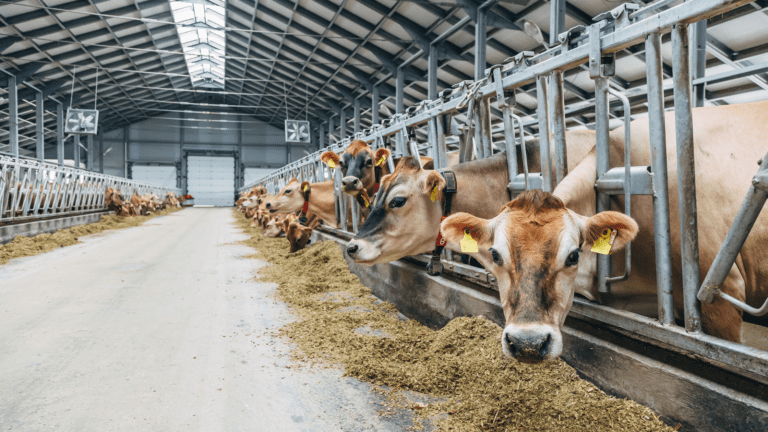Dairy farming is one of the most complex supply chains in modern agriculture.
Milk begins to go bad at any temperature above 40 degrees Fahrenheit. It is so sensitive to the air around it that even in one of the most thoroughly refrigerated environments, the grocery store, it is still important for personnel not to stack dairy products too high in display cases.
Milk may go bad as quickly as one hour in high heat or two hours at more moderate room temperature. Unrefrigerated milk in a clean, covered container is a loss after six hours even at room temperature, and usually already spoiled after four. Its fragility means reliable refrigeration is of the utmost importance.
To maintain low temperatures at all times, dairy farmers look to the Bitzer brand for their compressors.
Refrigeration is One of the Central Challenges in Dairy Farming
Milk is at the heart of the dairy industry, and Bitzer has gradually become the brand of choice for farmers who want superior performance for their unique needs. While other brands compete in the dairy space, Bitzer stands out – that’s especially true of the Bitzer 6FE-50.
Dairy farmers must follow strict standards in everything from milking the cows to distributing their products. After raw milk is collected, for example, the next step is to bring it to cooled storage tanks or a chilled trailer where it can be maintained below 40 degrees until transportation.
Even when the milk is out of the farmer’s hands, it travels in a highly refrigerated truck or trailer along an optimized route. That is, the route is calculated in advance for a minimum amount of time on the road, reducing wear on the refrigeration systems and risks of spoilage.
Naturally, a dairy farm is not responsible for every step in the process. Still, farmers have worked for decades to ensure their part is done with excellence. One of the biggest issues to contend with was how to keep the farm’s chilled storage facilities working 24 hours a day.
To do it, farmers needed:
-
The most durable equipment that could be trusted to operate a full ten years with maintenance
-
Premium levels of cooling power in a smaller footprint to optimize the use of productive space
Since the compressor is the “heart” of any refrigeration system, upgrading the compressor works to make other aspects of the system more effective – as long as they are compatible. It also helps farmers to have backup equipment readily available, so cost is a factor.
In all these ways and more, Bitzer has established its good name as one of the best manufacturers of compressor technology for agriculture. The growing popularity of its designs in a crowded and highly competitive compressor market is a testament to its quality.
The Bitzer 6FE-50 Compressor Has Become Essential to Dairy Farmers
When it comes to ensuring food safety, quality, and value, few other compressors have a strong reputation like that of Bitzer. German-based Bitzer SE leads over 60 locations and 3,500 employees worldwide and developed its engineering around strict EU food standards.
Now a major manufacturer of refrigeration components, the Bitzer story began in 1934 with a variety of expansion valves and dual-cylinder piston compressors, cutting edge at the time. From 1979 to 2000, Bitzer was extremely active and launched more than 40 subsidiaries.
Over the last 20 years, Bitzer compressors have seen an increasing presence in the U.S. dairy industry. The Bitzer 6FE-50 model is the most popular, as an example of Bitzer’s recent ECOLINE releases. A semi-hermetic reciprocating compressor, it is distinguished in a variety of ways:
-
High efficiency and reliability
-
Smooth mechanical operation
-
Solid and durable engineering
-
Flexible refrigerant selection
-
Wide range of applications
The 6FE-50 is one of the highest-rated ECOLINE designs by demanding consumers, including leaders in dairy and other agricultural sectors. With six cylinders and a large refrigerating capacity, the 6FE-50 is a solid selection for virtually any kind of chilled storage tank used for milk.
Use a Remanufactured Bitzer Remanufactured Compressor to Enjoy Quality and Value
Bitzer is a respected brand building a unique portfolio in dairy. To bring its benefits to your farm faster and at a lower price, consider a remanufactured commercial compressor. Remanufacturing delivers full Bitzer quality at a reduced price of up to 40% and can cut weeks off procurement time.
Plus, working with a trusted remanufacturer means you’ll have expert advice for maintaining your Bitzer compressor and getting optimal performance. That saves time by giving you a single point of contact in your neighborhood instead of working with wholesalers who may be located overseas.
It may only take a few minutes to render thousands of gallons of fresh milk unfit for sale. With the Bitzer 6FE-50 compressor, you can experience true peace of mind even as your dairy operations grow.












